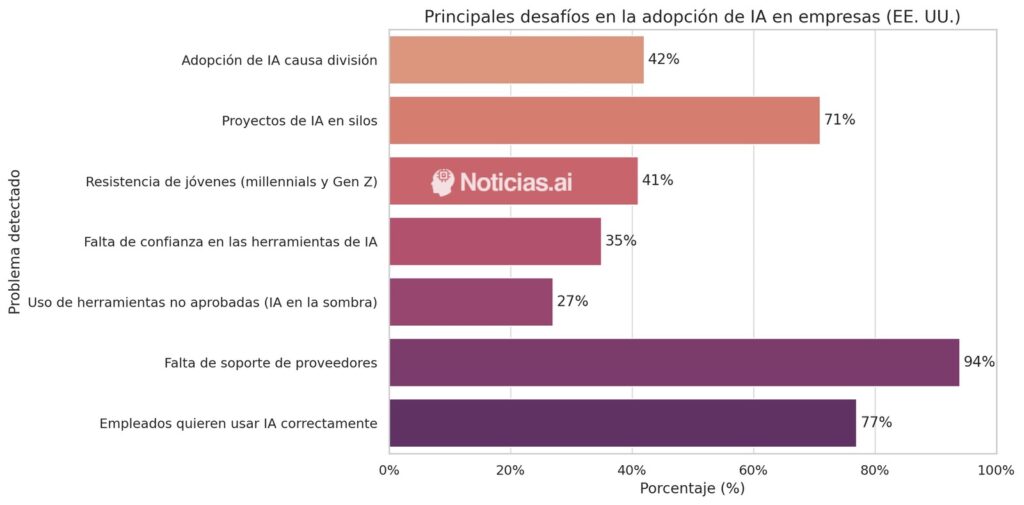A survey reveals that the challenges of generative AI are not technical, but human and organizational.
Generative artificial intelligence is transforming the business landscape at a dizzying pace. However, a survey conducted with 1,600 knowledge professionals in the United States—800 executives and 800 employees—reveals a concerning reality: far from generating immediate progress, AI is causing chaos in many companies.
The report, focused on key sectors such as finance, technology, retail, healthcare, and consumer goods, identifies seven structural challenges that hinder the effective adoption of AI in the corporate environment. The data points to a growing disconnect between the enthusiasm of business leaders and the actual experience of teams that must work alongside these tools.
Key obstacles, in numbers
According to the study, 71% of executives acknowledge that AI projects are being developed in silos, preventing a holistic view and limiting outcomes. Additionally, 42% claim that the incorporation of AI has caused internal divisions rather than significant advancements.
On the other hand, generational resistance is evident: 41% of young employees (millennials and Gen Z) actively oppose these initiatives. Some even go so far as to sabotage projects by entering incorrect data or ignoring training.
This disconnect also translates into low trust in corporate tools: 35% of workers turn to paid AI solutions on their own, believing those provided by the company do not meet their needs. This practice—known as “shadow AI”—is not negligible: 27% spend at least $25 a month on unauthorized tools, compromising organizational security.
Interestingly, 77% of employees consider themselves early adopters and want AI to succeed, but they demand adequate resources and guidance to integrate it efficiently into their daily routines.

And the problem doesn’t end there. 98% of executives expect their technology providers to help define their AI strategy, yet 94% express dissatisfaction with the support received.
The real issue: execution
The report concludes that the main obstacle is not the technology itself, but how it is implemented. Companies are obsessed with demonstrating immediate return on investment, neglecting organizational culture, training, and seamless integration of AI into existing workflows.
The result is a business ecosystem where AI is perceived as a threat or an additional burden, rather than a useful tool.
As seen in the graph, the figures reveal a perfect storm of disorganization, distrust, and mismanaged expectations that threaten the competitiveness of organizations that do not confront these challenges with a long-term vision.
Recommendation: before betting on AI, companies must strengthen their strategy, facilitate interdepartmental collaboration, and support their teams with resources and a clear narrative that addresses their fears, aspirations, and real needs.
📄 You can view the full report here.
Source: AI News.

